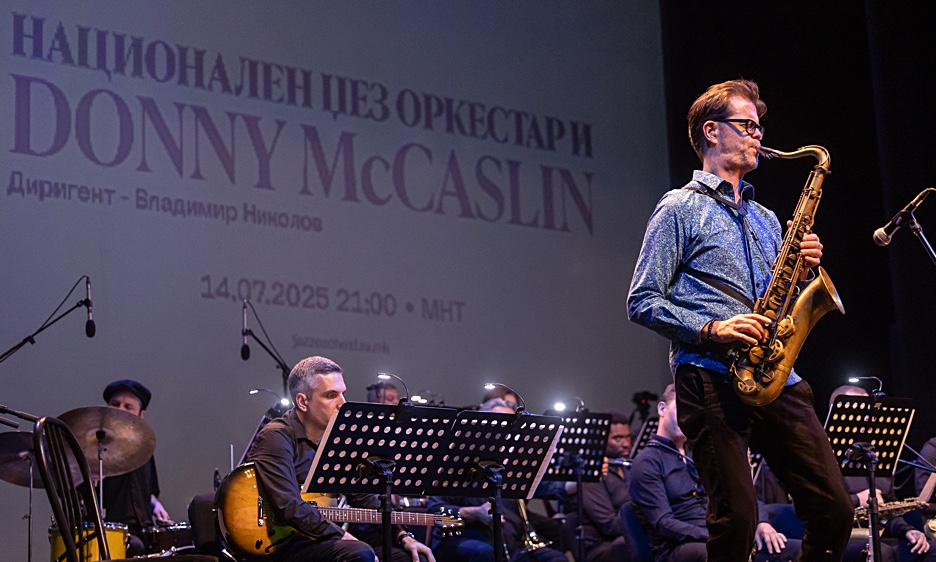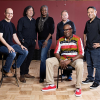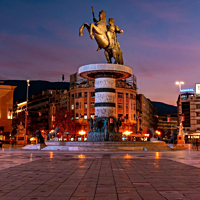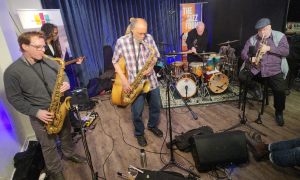Home » Jazz Articles » Live Review » Donny McCaslin and the Macedonian National Jazz Orchestr...
Donny McCaslin and the Macedonian National Jazz Orchestra at the National Theatre in Macedonia

Courtesy Maja Argakijeva
Macedonian National Theatre
Skopje, Macedonia
July 14, 2025
It's not every day that Skopje's National Theatre transforms into a playground for jazz on this scale, but when it does, the walls remember. On this particular evening, the Macedonian National Jazz Orchestra, under the baton of Vladimir Nikolov, shared the stage with Donny McCaslin, a saxophonist whose career has oscillated between modern jazz, genre-bending fusion, and collaborations with icons such as David Bowie. This wasn't just a concert; it felt like an open conversation between tradition and risk, between musicians, between meticulously crafted orchestrations and the electric pulse of improvisation, and between memories and present moments.
The setlist itself told a story. The program was ambitious, diving deep into the repertoire of composer Maria Schneider, with whom McCaslin has had a long-standing creative partnership. Her compositions are rarely straightforward; they are layered, painterly, and often driven by narrative. The orchestra opened the night with Schneider's "Wyrgly," a composition that immediately set an energetic tone. The piece began with bursts of sharp brass phrases, woven over a steady rhythmic pulse. These early fragments weren't just introductions—they returned throughout the piece, tying the sections together like a musical thread. The shuffle rhythm soon took over, creating space for Donny McCaslin to step in with a tenor saxophone solo that felt both grounded and exploratory. His playing balanced control with freedom, always aware of the larger ensemble but never holding back his personal voice. The focus then shifted to Corey Wilcox on trombone, who added another layer to the texture with a solo that was playful but measured. Toward the end, the guitar (courtesy of Zoran Kostadinovski) entered with a sharper tone, adding just enough grit to push the piece into a different color. It wasn't overdone—it simply expanded the sound of the big band into new territory without losing coherence.
Between the sets, McCaslin and Nikolov would step forward to explain the stories behind the pieces—a welcome bridge between the complex music and the attentive crowd. Before performing "Dance You Monster to My Soft Song," McCaslin shared a personal story. This was Bowie's favorite piece by Schneider, he explained, inspired by a Paul Klee painting. In that moment, the audience wasn't just listening to a piece of music—they were being invited into an emotional lineage, a memory chain that stretched from Klee's brush to Schneider's pen, to McCaslin's saxophone, and finally into the concert hall in Skopje. The slamming chords of "Dance You Monster to My Soft Song" introduced a wilder, more restless energy into the set. The piece moved through a wide range of dynamics, shifting from quiet passages to sections that felt powerful and urgent. Maria Schneider's arrangement revealed its usual complexity: dense, layered, and designed to provoke thought as much as to entertain. But at its core, this was a kinetic piece, carried forward by a kind of nervous momentum. The music never stood still; it stayed in motion, edgy and alive, with a frenetic pulse that refused to let go.
A highlight of the night came with the world premiere of "Victims of Greed," composed by conductor Vladimir Nikolov. The piece, inspired by the tragedy in Novi Sad last year (and addressing similar tragedies that hit the Balkans recently), where people have died due to corruption and system failure, was performed at McCaslin's personal request. Nikolov's conducting—precise yet unforced—guided the orchestra through this difficult material with a kind of quiet authority, allowing the music's message to speak for itself.
Schneider's "Coming About" gently unfolded through several distinct phases, beginning with a lengthy solo piano introduction by Gordan Spasovski that set a reflective, intimate mood. The rich sound of the big band gradually pared down to a focused trio of piano, bass, and cymbals. McCaslin's saxophone carried mournful melodies that lingered in the air, setting a contemplative tone. Just when it seemed the piece might close, a new phase emerged instead—bringing brilliant arrangements and solos that effortlessly drew applause from the audience. The intricate interplay of shifting tempos and dynamics kept listeners captivated throughout, with McCaslin remaining a constant source of wonderment. Yet it was Gordan Spasovski who shone brightest here, his piano work displaying both subtlety and brilliance, anchoring the evolving moods with remarkable finesse.
McCaslin's own composition, "Fast Future," followed. Arranged by Nikolov, it began with a short introduction evoking flamenco rhythms but with a rock pulse in the rhythm section. In general, it explored a fresh kind of fusion, mixing post-bop with breakbeats and rhythms drawn from electronica and EDM. The piece played with contrasts—fast, nervy moments countered by calm, meditative stretches. The rhythm section locked into a groove that was almost percussive flamenco but twisted through a modern jazz lens. It was a piece that unfolded like a map, revealing different landscapes as it moved forward. "Hand Gliding" followed—a composition inspired by her first (and terrifying) trip to Brazil. It started with a minimalist piano intro and subtle brass textures, building into a sweeping soprano saxophone passage. The flugelhorn solo was melodic, painterly, and slow, evoking open skies and gusts of wind. It was music as landscape painting.
Then came "Stadium Jazz," McCaslin's tongue-in-cheek nod to jazz that belongs in big spaces. It started melodically, only to be jolted by a jungle-like drum groove and rock rhythms. The highlight was a fiery saxophone duel between McCaslin and Macedonia's own alto saxophonist Kiril Kuzmanov. Trading phrases over dynamic drumming, their exchange thrilled the audience, before the piece returned to calm, like two marathon runners slowing to shake hands after a race. For the encore, McCaslin chose "Energy Generation," arranged by Sherisse Rogers—a funky, Tower of Power-inspired jam with long, playful saxophone solos over laid-back grooves. It was celebratory, a nod to the music he loved as a teenager.
What made the evening special wasn't just the technical brilliance on display, though there was plenty of that. It was the way the musicians approached each piece—with care, with risk, and with a sense of shared purpose. The Macedonian National Jazz Orchestra proved they are not just a local big band but an ensemble capable of handling some of the most demanding contemporary jazz with world-class sensitivity and flair.
What made the evening even more special was Donny McCaslin's warmth offstage. After the concert, he stayed to sign vinyls and CDs, casually chatting with everyone who approached him. There was no sense of hurry or distance—he greeted each person with genuine attention, creating the kind of relaxed, friendly atmosphere that made him feel less like a visiting star and more like a gracious host. It was a simple gesture, but it left a lasting impression, rounding out the night with a sense of connection that extended beyond the music itself.
Tags
PREVIOUS / NEXT
Support All About Jazz
 All About Jazz has been a pillar of jazz since 1995, championing it as an art form and, more importantly, supporting the musicians who make it. Our enduring commitment has made "AAJ" one of the most culturally important websites of its kind, read by hundreds of thousands of fans, musicians and industry figures every month.
All About Jazz has been a pillar of jazz since 1995, championing it as an art form and, more importantly, supporting the musicians who make it. Our enduring commitment has made "AAJ" one of the most culturally important websites of its kind, read by hundreds of thousands of fans, musicians and industry figures every month.


























